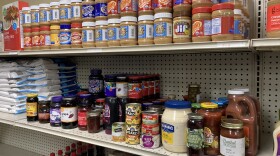Concerns about water quality and quantity have become global themes, but Seth Siegel says until a few years ago, he knew nothing of water scarcity issues.
Siegel, a native of New York, co-founded several companies, including Beanstalk, the world’s leading trademark brand extension company.
He says water enlightenment struck when he attended a seminar in Manhattan.
“I am a member of a foreign policy think tank called the Council on Foreign Relations. At that time four years ago nobody was talking about water scarcity,” Siegel says.
He says a U.S. official with a foreign service agency told the group that “the U.S. government believed with a high degree of certainty that 60 percent of the world’s landmass would be experiencing water scarcity issues,” Siegel says.
He couldn’t believe how little public officials were talking about the issue. So Siegel set out to educate himself and to look for solutions.
Siegel says he learned Israel has a model worth considering.
“Israel doesn’t have the only answers to all the water problems, but Israel is the world’s most sophisticated water society and water economy. Therefore we’d be wise to learn a lot from them,” Siegel says.
He distilled Israel’s story in his book Let There Be Water: Israel's Solution for a Water Starved World was published last September.
While the country should be one of the most water-starved in the world, 60 percent of the nation is desert and its population has grown tremendously, Israel is water-rich.
Siegel says water management planning began early in the country’s formation.
“It’s very much baked into the consciousness everywhere. Schools starting in nursery school start to teach children how to brush teeth, how to shower and they migrate that (information) to the home,” Siegel says.
He says early on Israel folded in smart legislation and governance along with a belief in sound science.
Siegel interviewed 220 people in the course of putting his book together. One was Shimon Peres, Israel's president from 2007 to 2014.
“The reason I wanted to interview him was not because he was then the president of Israel; he was one of the most famous people of his generation who lived on one of the collective farms, one of the kibbutzim,” Siegel adds, “They came from Europe with a scientific orientation and a desire to change the world and so therefore they were always experimenting.”
The country devised an agricultural scheme.
“Our agricultural in the United States absorbs about 70 percent of our freshwater, around the world as much as 95 percent in some countries. If you can modify agriculture you can cut down on your freshwater usage,” Siegel says.
He met the inventor of drip irrigation, Simcha Blass.
“He was really the Leonardo de Vinci of water. He was responsible for basically every great water innovation, he’s the one the Zionists turned to to write the (water management) plan,” Siegel says.
He predicts drip irrigation will be the transformative affect of agriculture in the United States and around the world very soon,” Siegel says.
There’s more to Israel’s agricultural story, including development of more resilient seeds and, Siegel says, thinking of water in every form you find it. Desalination is another piece of Israel’s water management portfolio.
“Israel didn’t invent desalination. It’s an ancient idea, but Israel has instituted one innovation after another that allows the world to have a desalinated water at a low cost, at a relatively low carbon footprint,” Siegel says.
Siegel acknowledges that currently the technology swallows up a great deal of energy, however he believes desalination should be used as an “insurance policy” not a stand-alone water solution.
“I would argue that the countries that use exclusively desalinated water are the real carbon footprint problems. In places like Israel and Carlsbad, California where the water there augments the rest of the supply. It still uses carbon fuels but it’s not the entire story,” Siegel adds, “therefore, I would argue that intelligent use desalination is a very important addition to our water profile particularly in an ever-drying world.”
Siegel says one of the surprising “finds” in his research is something he terms 'hydro diplomacy”.
“In 1962 there was a severe earthquake in Iran. The Shah of Iran was then leading the country and reached out to ask if Israel could send a couple of water engineers to help him figure out what to do,” Siegel says.
Those three turned to over 100.
“There were so many Israeli hydrologists, geologists, water engineers, mathemeticians and statisticians working in Iran, that a Hebrew language school was set up for the children of these water experts. Shopkeepers in Iran learned Hebrew,” Siegel says.
He interviewed people who lived in Iran at the time.
“The Iranian people could not have been more friendly to the Israelis. They appreciated them. The sad story is that in 1979 the Shah fell, the Ayatollah comes to power….and then Iran goes into a long, slow slide of the decline of its high quality water sector,” Siegel says.
Today, Siegel says Israel is sharing water management technology with 150 countries. He finds that fact encouraging, beyond the fact that those partnerships fuel Israel’s economy.
“The reason that number is so significant is that there are not 150 coutnries around the world today that have diplomatic or commercial relations with Israel….And I think that is very helpful, in the same way that China snuck Israeli hydrologists into the country and developed a warm relationship I think in that same way we can see a very wonderful future whereby a lot of countries are going to say we have big water problems…..We want more of what Israel has to offer,” Siegel says.
He thinks it’s a hopeful sign for the world and world peace.
“It’s good for the world’s environment, it’s good for the world’s economy, it’a good for people all over the world who would otherwise suffer, and it’s good for the cause of breaking down barriers,” Siegel says.
Siegel calls his life before his global water awakening - rich and fulfilling. But THIS issue consumes him now.
He’s already working on a second book. “A book that is more polemical, a little bit angrier. And what it talks about is how we got into this mess, and what we must do to get out of this mess,” he says.
Siegel’s “lecture” style includes a healthy dollop of humor. Will that be absent if there’s a next book tour?
“I think that if we ever stop laughing, we might as well just hang it up. Just because we have serious problems doesn’t mean we can’t also have a good time,” Siegel continues, “if that’s the way I have to feed them the medicine, I’m glad to also share humorous stories and wonderful experiences.”
Author Seth Siegel sits on the boards of several not-for-profit organizations, including the Heschel School and NLI-USA, the organization charged with rebuilding the National Library of Israel.






